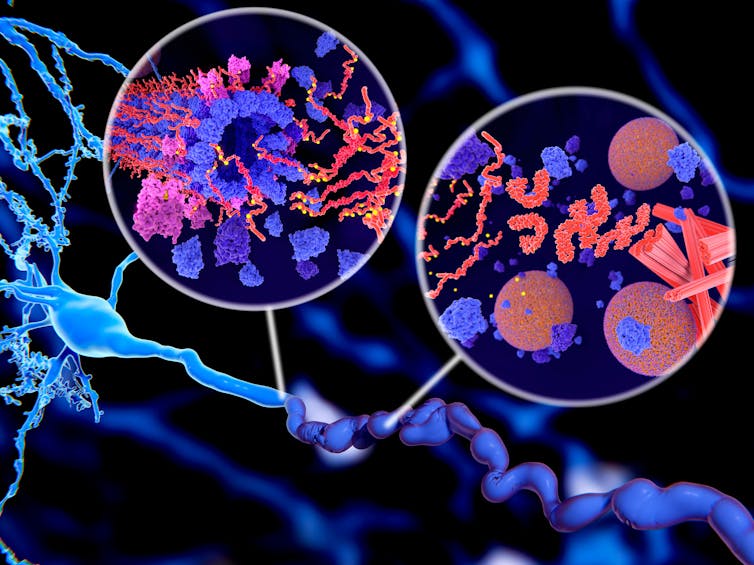Researchers may have found an unlikely contributor to the development of Alzheimer’s disease: the bacteria in your gut. Their study, published in the journal Science, suggested that certain gut bacteria increase the brain damage seen in mice with an Alzheimer’s-like disease.
In Alzheimer’s disease – the most common form of dementia – proteins build up abnormally in the brain. One of these proteins is called tau, and its build-up causes the death of brain cells that are involved in memory, causing forgetfulness and eventually permanent memory loss.
The researchers were working with a group of mice with a genetic mutation that causes the accumulation of tau protein in the brain. The mice were split into two groups: one group had a healthy gut microbiome (the collection of bacteria, viruses and fungi which live in the gut), while the other lacked a gut microbiome completely (these mice are nicknamed “germ free”). By the time they reached old age, the germ-free mice had significantly less brain damage caused by tau.
The germ-free mice also had a lower level of tau-associated inflammation in their brains. High levels of inflammation are seen in the brains of people with Alzheimer’s, contributing to brain damage. So the lower level of brain inflammation could be one of the reasons less brain damage was seen in these mice.
One of the main causes of Alzheimer’s-associated brain inflammation is the activation of a certain type of immune cell, known as microglia. Microglia are known to be regulated by the gut microbiome, which might explain why germ-free mice had lower levels of active microglia.

Science Photo Library / Alamy Stock Photo
Removing the gut microbiome is not the solution
If you’ve heard of the gut microbiome, you might know that it is usually thought of as being important for our overall health. So the suggestion that not having a microbiome could reduce the severity of Alzheimer’s is surprising. However, if you’re wondering whether removing your gut microbiome might reduce your chances of developing the disease, you might be disappointed.
Everyone has a unique gut microbiome, which is home to millions of different types of bacteria, some of which are beneficial and some of which can be damaging to our health. One explanation for the study’s findings is that only a certain type of bacteria is involved in increasing brain inflammation and brain-cell death caused by tau.
The researchers tested this idea by dosing a third group of mice, which had a healthy gut microbiome, with antibiotics. The antibiotics reduced the level of inflammation in the brain, as well as the activation of microglia, although only in male mice. What’s interesting is that only certain types of gut bacteria were reduced by the antibiotics, so it might have been one of these bacteria that was helping cause brain damage in the mice.
It’s unclear why antibiotics only improved outcomes in male mice, but not females. In humans, Alzheimer’s disproportionately affects women. It’s not clear why, but research suggests that one reason women are at greater risk of Alzheimer’s could be the impact of hormone changes that occurs during menopause.
That the gut microbiome can affect the brain is unsurprising. Over a decade of research has revealed that there are strong communication links between the two, known as the gut-brain axis. The gut-brain axis helps regulate multiple bodily processes, including the immune system and, therefore, inflammation.
This is not the first study to have pointed to the role that the gut microbiome may have in developing Alzheimer’s disease in mice. There’s also evidence that the gut microbiome is different in people with Alzheimer’s disease compared to those who are healthy.
While the idea that the gut microbiome is linked to Alzheimer’s is compelling, it’s important to interpret the results of the study with caution. Mice, especially those with genetic mutations, are very different to humans. Their immune system, their genetics and, critically, their gut microbiome all have differences.
Germ-free mice also have an underdeveloped immune system. Their gut-brain axis is affected too, with research in germ-free mice showing changes to their behaviour and brain signalling compared with normal mice. These differences could also be a reason the germ-free mice in the study didn’t develop such severe Alzheimer’s.
Based on current research, it can’t be claimed that bacteria in the gut microbiome contribute to Alzheimer’s disease in humans. Instead, the research points to the possibility that there are specific bacteria within the gut microbiome that could increase the risk of developing Alzheimer’s. If it can be shown that there are similar bacteria in humans that have similar effects, the possibility that targeting them might form a new basis for treating Alzheimer’s is an exciting prospect.




